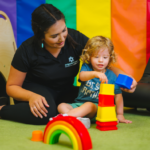The end of summer break marks the beginning of a new school year. For many families, this is a time filled with excitement and anticipation. But, for families with children with special needs this time can bring about unique challenges and considerations. As your child returns to school, it’s crucial to be vigilant about potential regressions in their skills and prepare for a successful academic year. In this blog, Brighton aims to provide back to school tips and guidance on recognizing regression, collecting data for future support, fostering effective communication with your child’s educational planning team, and empowering you to be your child’s best advocate.
 Recognizing Regression and Addressing It Early
Recognizing Regression and Addressing It Early
Regression, the loss of previously acquired skills, is common after extended breaks, like summer vacation. Children with special needs may be particularly vulnerable to regression. As a family, it is essential to observe and identify any areas where your child might be struggling. One of our back to school tips is to look out for changes in their communication, social interactions, motor skills, academic performance, and self-help abilities.
If you notice any regression, don’t panic. Instead, communicate with your child’s teachers and support team to understand how to address these challenges effectively. Early intervention can prevent further setbacks and facilitate your child’s progress. By collecting data and keeping track of your child’s progress, you will be better equipped to address any challenges that may arise later in the school year. Consider maintaining a daily journal or utilizing apps that can help you monitor your child’s development over time. It is as easy as taking last year’s IEP and IEP progress reports, and then comparing them to any reports you get from the first grading period. Call for a parent teacher conference to discuss any changes, good or bad.
 The Power of Data Collection
The Power of Data Collection
Data collection is a powerful tool that empowers families and educators alike. By keeping track of your child’s progress, you can gain valuable insights into their strengths, weaknesses, and overall development. During the initial weeks of the new school year, start recording your child’s daily performance in various areas. Another one of our back to school tips is to use a simple journal or digital tracking tools to monitor:
- Academic performance (e.g., reading, writing, math)
- Social interactions and communication skills
- Behavior and emotional well-being
- Independent living skills (e.g., dressing, feeding)
- Motor skills (e.g., fine and gross motor)
Regularly sharing this data with the educational planning team allows them to tailor support and interventions to your child’s needs. This can also be an opportunity to call for a parent/teacher conference. At this time, you can ask them explain what data they take into consideration and how they note that for Extended School Year (ESY) consideration.
Effective Communication with the Educational Planning Team
Open and consistent communication with your child’s educational planning team is vital for the upcoming school year. This, with an effective partnership with the educational planning team is essential for your child’s success in school. After the first month of school, schedule a meeting with the team to discuss your child’s individualized education plan (IEP) or 504 plan (if applicable). Establish clear expectations for communication and information flow, ensuring that any updates or concerns are promptly shared between both parties.
Back to School Tips for Better Communication
 Here are some back to school tips to establish clear expectations for communication and information flow:
Here are some back to school tips to establish clear expectations for communication and information flow:
- Schedule Regular Meetings or Send Emails: Set up regular meetings with the school’s special education coordinator, teachers, therapists, and other relevant team members. These meetings can be in person or virtual, depending on the circumstances. Discuss your child’s progress, challenges, and any concerns you may have. To prepare for these meetings, send the team emails that outline what you look to gain from your meetings, even if it is just a better understanding of your child’s educational plan.
- Share Data and Observations: Provide the team with the data you’ve collected, sharing both successes and areas of concern. This information will help them understand your child’s needs more comprehensively and develop appropriate strategies.
- Collaborate on Goals: Work together to set achievable goals for your child’s academic, social, and emotional development. Ensure that these goals are measurable and have clear timelines for assessment.
- Stay Informed about Resources: Stay updated on available resources, workshops, and support groups that can benefit your child and your family. Engaging with other parents of children with special needs can provide invaluable insights and support.
- Be Your Child’s Best Advocate: Remember that you are your child’s most important advocate. If you have concerns about the educational program or the support provided, express them respectfully and work with the team to find solutions.
Collaborating on Solutions
Challenges may arise throughout the school year, and it’s essential not to hesitate when reaching out to the educational planning team. Collaboration is key to finding effective solutions. Whether it’s behavioral issues, learning difficulties, or social interactions, working together with teachers, therapists, and support staff can create a supportive and nurturing environment for your child. Remember, you are a valuable member of the team, and your insights into your child’s needs are invaluable.
Continuing Education as Parents
As a parent of a child with special needs, your role as an advocate is of utmost importance. Stay informed about your child’s specific condition, research best practices, and seek additional resources to enhance your knowledge and understanding. Attend workshops, webinars, or support groups to connect with other parents facing similar challenges. By educating yourself and taking some our back to school tips to heart, you can confidently engage in discussions with the educational planning team and advocate effectively for your child’s needs.
Returning to school after the summer break can be both exciting and challenging for families with children having special needs. By being attentive to potential regressions, collecting data, and maintaining open lines of communication with the educational planning team, you can ensure a successful academic year for your child. Remember, collaboration and problem-solving go hand in hand. Don’t hesitate to reach out to the team when challenges arise, and continue educating yourself as a parent to be your child’s best advocate. With dedication and support, your child can thrive in the school environment and achieve their full potential.















